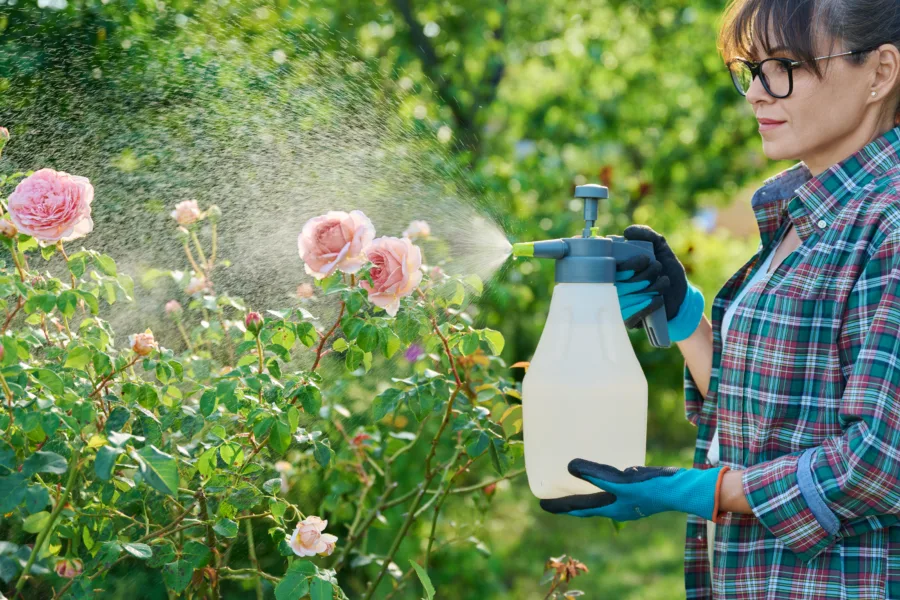
Gardening is not only a hobby, but a constant balance between the care of plants and a defense strategy against numerous parasites. Aphids, mites, caterpillars, flies and other unwanted guests can ruin in no time weeks or even months of hard work. Many people still resort to synthetic pesticides which, although they act quickly, are harmful to the ecosystem, the pollinators and even for our long -term health.
There is an alternative, and it is effective. Natural sprayprepared at home with basic ingredients such as garlic, citrus zest and vegetable oil, offers a safe way to protect plants. Using them correctly, not only will you protect your garden, but you will also support a sustainable gardening approach. Below we present three tested recipes, examples of use and suggestions for optimal results.
1. Garlic spray: a large spectrum natural insecticide
Against who is active:
The garlic spray is effective against aphids, mites, white cabbage, tripides, altics and even some types of mold. Because of its strong smell, garlic confuses the sensory receptors of the parasites and discourages them from dating.


For which plants:
It is suitable for most vegetables, such as tomatoes, peppers, lettuce, cabbage, beans, but also fruit trees and ornamental plants, such as roses and hibiscus. The use on very sensitive plants is not recommended with soft leaves (for example some varieties of orchids), for which it is recommended to carry out a preliminary test on a small area.
Preparation:
- Treat 5 cloves of garlic and soak them in 0.5 liters of water for 12 hours.
- Add 2 teaspoons of detergent for the dishes.
- Filter through a tightened or gauze strainer.
- Dilute the mixture with 1 liter of water.
- Pour the product into a spray bottle and spray it on the plants, especially on the lower part of the leaves, where parasites are usually nestled.
2. Citrus spray: protection with the power of limb
Against who is active:
Citrus spray with a high level of limonene and other essential oils that acts as a natural repellent against aphids, ants, mites, mosquitoes, tripides and tarmes. Essential oils cause suffocation and disorders to the nervous system of parasites.


For which plants:
It is ideal for fruit plants (lemons, mandarins, apple trees), aromatic herbs (mint, basil, thyme) and apartment plants. It is slightly more delicate than garlic spray, so it is also suitable for young plants in the initial stages of growth.
Preparation:
See also


- Grate the zest of 1 lemon or 1 orange.
- Pour 0.5 liters of boiling water.
- Leave covered for 24 hours.
- Filter and pour into a spray bottle.
- Spray the plants once a week or according to need.
3. Oleoso spray – mechanical insecticide for lasting protection
Against who is active:
It acts mainly on mechanical parasites such as aphids, mites, tripides, white flies and some caterpillars. The oil covers the parasitic body and suffocates it, therefore it is particularly effective on eggs and larvae.


For which plants:
It is suitable for all fruit and ornamental plants, but especially roses, citrus fruits, courgettes, cucumbers and peppers. The use on plants with hairy leaves is not recommended, since the oil can obstruct the pores and then inhibit photosynthesis.
Preparation:
- Mix 1 cup of vegetable oil with 1/4 cup of detergent for the dishes and mix well.
- For nebulization, use 1 teaspoon of this mixture for 1 liter of water.
- Mix well and pour into a spray bottle.
- Spray the plants in the morning or in the evening, never in direct sunlight.
Conclusion:
Natural sprays are not just a passenger fashion in sustainable gardening: they are effective, convenient and, above all, safe for people, animals and pollinators. With regular use and adequate preparation, you can significantly reduce the presence of parasites in your garden without compromising the health of your plants or ecosystem. If you are looking for a sustainable gardening approach, moving to natural sprays is one of the most sensible measures.





